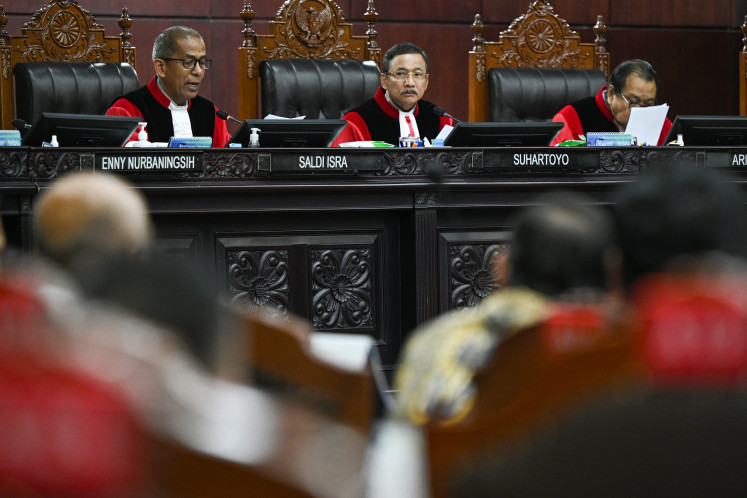Popular Reads
Top Results
Can't find what you're looking for?
View all search resultsPopular Reads
Top Results
Can't find what you're looking for?
View all search resultsCost recovery or gross split in oil, gas contracts?
The gross split system was introduced in January 2017 in place of the old cost recovery scheme for oil and gas
Change text size
Gift Premium Articles
to Anyone
T
he gross split system was introduced in January 2017 in place of the old cost recovery scheme for oil and gas. However, the energy and mineral resources minister decided in late 2019 to allow companies bidding for new blocks or contract extensions to choose between the two contract mechanisms.
The good intention to boost investment in the oil and gas industry should be appreciated by all stakeholders. However, I beg to differ.
In each game (system), the rules are set by the organizer, who has the authority to maintain, or change, them. The players who are interested are welcome to join the game, assuming they are comfortable with the rules. In this case, the game plan is set by the government and the players are the investors who are interested in risking their money for profit over time.
Seeking high returns is intrinsic to an investor just as it is the duty of the government as the game master to make the game as attractive as possible without compromising the welfare of its people.
Fairness is the keyword in conducting any business deal, yet fairness is relative. The government needs to set a game plan that is tempting enough so the investors will choose to come here instead of other countries, while also putting more weight on the state’s benefits.
Both fiscal regimes have their own positive and negative sides, which have been discussed in many articles, and it is not the purpose of this article to compare them. This article merely suggests that it is a bad idea to have two variant fiscal systems. The government should pick one system and fully implement it.
However, before any decision is made, the government needs to seriously revise and simplify the split calculation under the gross split fiscal system, as it is defined incorrectly and is overly complex and impractical. One of the reasons is the lack of subsurface input.
For instance, a split definition for an onshore remote area is only 4 percent compared to 16 percent for a deep water offshore area, while, in practice, some exploration costs, e.g., seismic acquisition in onshore remote areas, is much more expensive compared to deep water offshore areas. Hence, the split definition in such a case does not make sense at all.
______
[...] it is a bad idea to have two variant fiscal systems. The government should pick one system and fully implement it.
______
Furthermore, an example where the gross split calculation is too complicated and impractical is with the hydrogen sulfide (H2S) and carbon dioxide (CO2) contents. In an area where these two components vary with depth, they will add complexity to the split calculation, and eventually the complexity will be compounded when each variable split is added to the calculation.
Finally, if the gross split fiscal system is chosen, for it to succeed, the government needs to make sure that all authorities involved embrace the implementation with a big open heart as the gross split is intended to boost investment by reducing the cycle time, which translates to less government involvement in the decision making process such as authorization for expenditures, financial quarterly reports , work plan and budget, the tender process and plan of development.
For the cost recovery fiscal system, which has been implemented for decades, the government needs to accept the fact that the Indonesian oil and gas sector has matured, which makes cost recovery seem like a burden for the government when it is due, while in fact, what is recovered under the cost recovery system is not government funds but for free interest loans from the investors.
If cost recovery is chosen, a breakthrough in mindset is needed, especially in the exploration stage. The government needs to support and make all efforts to crystalize all exploration activities proposed by investors. If exploration activities lead to a commercial discovery, the cost will be paid by the discovery, yet if it fails, the investors will have to bear all the costs, so there are no risks at all for the government.
That said, the focal point of this article is why it is a bad idea to have the option of two fiscal systems.
It is bad because it adds more complexity to manage and regulate two different systems. If we can simplify, why make it complicated?
If I were to choose, the old cost recovery system would be my recommendation for the following reasons: The government and investors are already familiar with this system, which has been implemented and effective for more than 50 years; mineral right sovereignty has never been questioned unlike with gross split; it is based on a law, not a ministerial regulation as is the case with gross split; and the current gross split calculation is excessively complicated and confusing to validate each variable split, for example, CO2 and H2S contents, American Petroleum Institute gravity value, sea bed and reservoir depth, measurement method, location and equipment.
______
Executive at PEXCO Energy, a Malaysian oil and gas company. The views expressed are his own.










